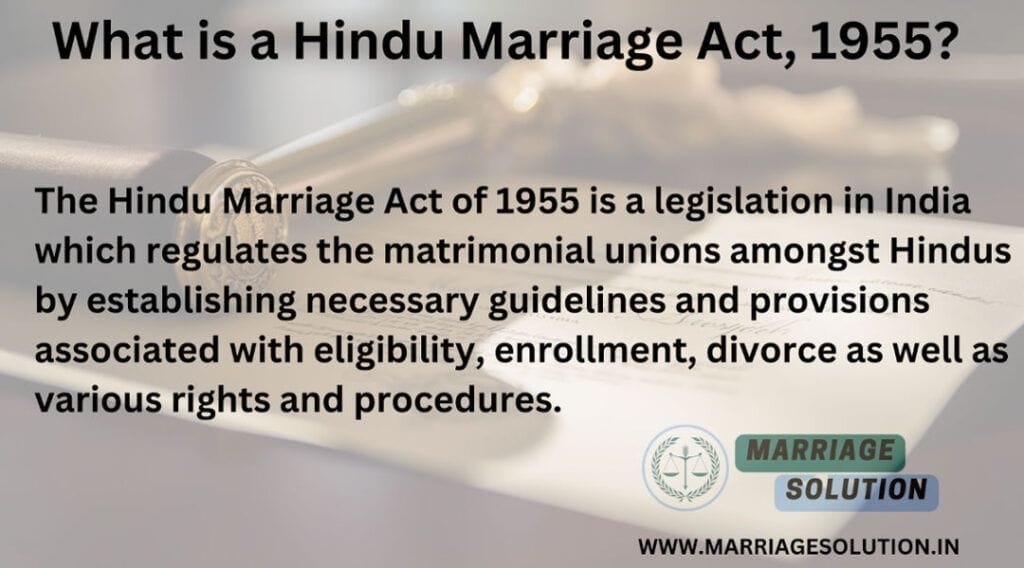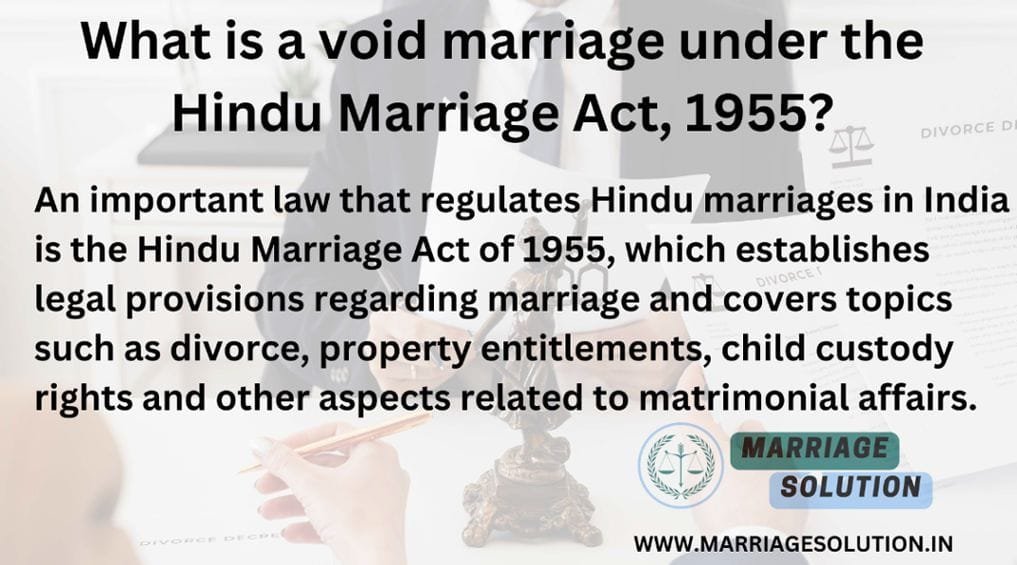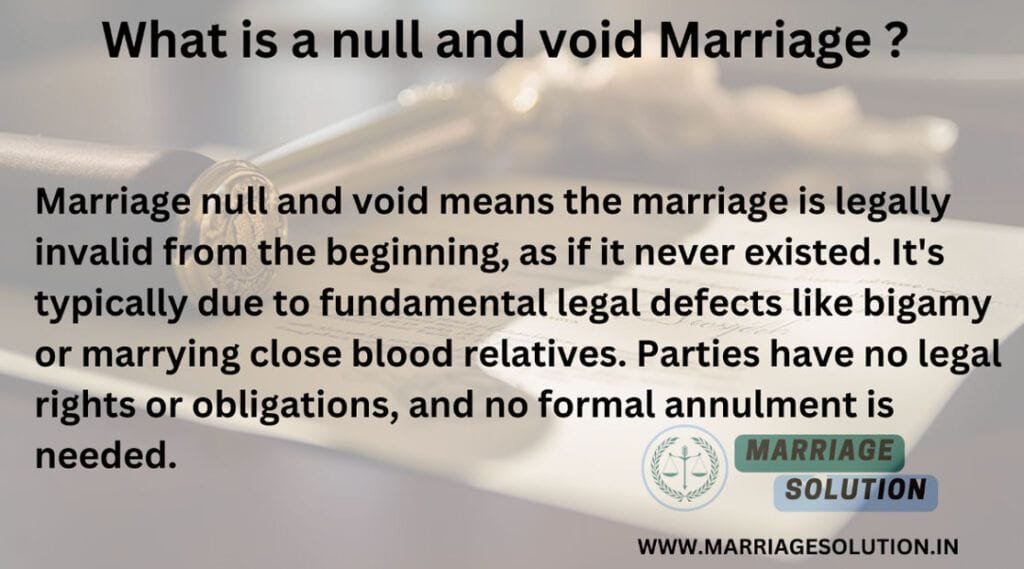Table of Contents
Introduction
In 1955, the Hindu Marriage Act was introduced in India with a view to regulating marriages within the Hindu community. This legislation outlines various legal aspects of marriage such as eligibility criteria, rights and responsibilities of both partners, registration procedures for weddings and grounds on which divorce can be granted. The ultimate goal is to provide an overarching structure that allows Hindus’ foreseeable unions while safeguarding fairness, equality and protection of personal liberties among individuals who belong in this fraternity.

Under the Hindu Marriage Act, 1955, void and voidable marriages are addressed in Sections 11 and 12
In India, the legal aspects of Hindu marriages are regulated under The Hindu Marriage Act of 1955. This law categorizes different types of marriage, such as void and voidable marriages.
Explaining the Concept of Voidable Marriages: A voidable marriage is initially recognized as valid but can be invalidated by one or both partners under certain legal circumstances. Such factors may include fraud, coercion, incapacity or non-compliance with legal requirements and are usually laid down in family law statutes. Unlike inherently invalid void marriages, the validity of a voidable marriage remains legally intact until annulled through court proceedings. These proceedings give spouses an opportunity to contest its legality based on specified grounds before dissolution occurs.
Explaining the Concept of Void Marriages: Marriages that are considered invalid from the outset due to specific legal reasons outlined in legislation are known as void marriages. This means that under the law, these unions never existed and do not carry any weight with respect to marital rights or obligations. Void marriages commonly occur if one is involved in bigamy, incest, or lacks legal capacity for marriage (e.g., underage). In cases like these, parties who attempted a union cannot be regarded legally married since it was null and void ab initio; there isn’t an annulment process required unlike with voidable marriages. Nonetheless consulting professional counsel can help handle related lawful considerations successfully.
Hindu Marriage Act, 1955, void and voidable marriages
1)Definition :A void marriage is regarded as invalid under the law from its inception. Marriages that are considered invalid (as per Section 11)
A void marriage is regarded as legally non-existent from the outset, implying that in legal terms, it’s just like the union never took place. Therefore, it can’t be considered valid.
1)Grounds: Void marriages are subject to certain conditions as stipulated in Section 11 of the Hindu Marriage Act, pertaining to:
2)Prohibited Relationships: The marriage becomes invalid if either party involved is below the legally recognized age for marriage, also known as underage marriage. Children Children born out of a void marriage may be considered illegitimate in the eyes of the law, which can affect issues such as inheritance and maintenance.
3)Sapinda Relationship: forbidden to have relationships with close relatives such as siblings or ancestors and descendants. Marriages between them are not recognized and considered invalid.
If individuals who are related within the forbidden degrees according to Hindu traditions marry, their union is considered invalid under Sapinda Relationship.
4)Bigamy: If one of the parties is already married and their previous spouse is still alive, any subsequent marriage shall be nullified due to bigamy.
5)Unsound Mind: If one of the parties is unable to comprehend the essence and aftermaths of marriage due to mental incapacity, then their union will be considered invalid.
6)No Legal Effect: Marriages that are invalid have no legal consequences. They do not establish any obligations or entitlements among the individuals, such as property and maintenance rights.
7)Court Intervention: A court order is not required to declare a void marriage invalid through court intervention.
Marriages That Can Be Invalidated (Section 12):
1)Initially Valid: voidable marriages are regarded as valid until a court nullifies them, unlike void marriages.
2)Fraudulent Consent: The Hindu Marriage Act specifies particular conditions laid out in Section 12 under which voidable marriages can be dissolved through annulment.
3)Undue Influence In the case of forced consent, where marriage approval is obtained using coercion, threats or forceful means, it renders the union voidable.
4)Mental Incapacity The annulment of a marriage can be granted if one party provides fraudulent consent by deceiving the other about a significant aspect related to the union.
5)Incapacity of the Mind: When either spouse is unable to comprehend the essence and outcomes of wedlock owing to their mental incapacity, nuptials can be annulled.
6)If a party is impotent and unable to engage in sexual intercourse, the marriage may be annulled.
7)Pregnancy by Another Person: In the event that a wife is pregnant by another man at the time of marriage and her husband is unaware, their union may be considered voidable.
8)Requires Court Decree A court decree is necessary for an annulment of a voidable marriage. The party that has been affected must file a petition with the court to request the nullification of their marriage.
9)Children A voidable marriage, when annulled, is retroactively deemed to be void as of the date of its ceremony.
Children born in a marriage that can be declared void are regarded as legitimate, except when the reason for annulment is bigamy.
Voidable Marriage

Certainly, here’s a pointwise explanation of a voidable marriage:
- Initial Validity: A voidable marriage begins with the presumption of validity, meaning it is considered legally binding upon its formation.
- Legal Conditions: Certain legal conditions must exist for a marriage to be deemed voidable. These conditions typically include factors such as fraud, coercion, incapacity, or failure to meet legal requirements for marriage.
- Annulment Option: Unlike void marriages, which are inherently invalid and require no formal annulment, a voidable marriage can be annulled by one or both spouses through legal proceedings.
- Legal Process: Annulment proceedings involve presenting evidence to a court to demonstrate the grounds for voiding the marriage. This may include proving fraud, coercion, or lack of capacity at the time of marriage.
- Legal Validity Until Annulled: Until annulled by a court, a voidable marriage retains its legal validity, meaning the parties involved are recognized as spouses and have rights and obligations typical of marriage.
- Implications of Annulment: Once annulled, the marriage is retroactively considered invalid, as if it never legally existed. This may have implications for matters such as property division, financial support, and custody arrangements.
- Legal Advice: Given the complexity of voidable marriage issues, seeking legal advice from a qualified attorney experienced in family law is advisable. A legal professional can provide guidance on navigating the annulment process and resolving associated legal matters effectively.
nullity marriage/marriage null and void

1)Definition A invalid and void marriage is considered legitimately invalid from its initiation, like it never existed under the law.
2)Reasons for Nullity: The nullity of a marriage can be inferable from a few lawful reasons, including polygamy, interbreeding and deficient legitimate limit.
3)Legal Status: Gatherings engaged with a marriage considered invalid and void are not recognized as mates under the general set of laws, subsequently absent any and all any standard conjugal honors or obligations.
4)Consequences: The demonstration of invalidating a marriage has huge lawful repercussions that leave couples without the commonplace legitimate freedoms as well as certain limitations related with being hitched.
5)Annulment Requirement Unlike voidable relationships, invalid and void associations don’t require formal dissolution techniques since they are considered invalid and invalid stomach muscle initio.
6)invalid abdominal muscle initio: Marriages considered invalid and void are thought of “invalid abdominal muscle initio,” highlighting their shortfall of lawful legitimacy all along.
7)Legal Advice: It is prescribed to look for the direction of a capable family regulation legal advisor to deal with the lawful outcomes of an invalid marriage successfully.
Difference Between Void and Voidable Marriage
| Aspect | Void Marriage | Voidable Marriage |
|---|---|---|
| Legal Status | Invalid from the beginning (null and void ab initio) | Initially valid but can be annulled under specific conditions |
| Reasons | Fundamental legal defects (e.g., bigamy, incest) | Legal flaws that allow annulment (e.g., fraud, coercion) |
| Recognition | Not recognized as a legal union | Recognized as a legal union until annulled |
| Consequences | Parties have no legal rights or obligations | Parties may have legal rights and obligations until annulment |
| Annulment Required | Not required; inherently invalid | Annulment may be sought through legal proceedings |
If you require assistance with court or any other Cases.
court or any other Dowry-related issues, our Home – MarriageSolution.in: Your Trusted Partner in Family Legal Matters. Law Services, IPC Section blog, Expert Advice, court cases lawyer help. website may prove helpful. By completing our enquiry form and submitting it online, we can provide customized guidance to navigate through the process effectively. Don’t hesitate to contact us for personalized solutions; we are here to assist you whenever necessary!
Women Helpline: Centre Government
https://www.ncwwomenhelpline.in This official website provides valuable information and resources related to labour laws, policies, and initiatives in India. Visitors can access a wide range of information
What is a void marriage under the Hindu Marriage Act, 1955?
A void marriage is one that is considered null and invalid from the beginning under the law. It is essentially treated as if the marriage never legally existed.
What are some common reasons for a marriage to be declared void under the Hindu Marriage Act?
Common reasons include bigamy (being married to more than one person at the same time), marrying a close blood relative (incest), or lack of legal capacity (such as being underage or mentally incapacitated).
What legal rights do parties have in a void marriage under the Hindu Marriage Act?
Parties in a void marriage have no legal rights or obligations typically associated with marriage. They are not recognized as spouses under the law.
What is a voidable marriage under the Hindu Marriage Act, 1955?
A voidable marriage is initially considered valid but can be annulled by one or both spouses under specific legal conditions outlined in the Act.
What are some grounds for a marriage to be declared voidable under the Hindu Marriage Act?
Grounds may include fraud, coercion, incapacity, or failure to meet legal requirements for marriage.
How does the process of annulment work for a voidable marriage under the Hindu Marriage Act?
Parties may seek annulment through legal proceedings, presenting evidence to demonstrate the grounds for voiding the marriage to a court
- AFSPA Act
 AFSPA act mean Armed Forces Special Powers Act (AFSPA) grants special powers to the Indian Armed Forces in areas classified as “disturbed” due to significant insurgency or internal disturbances.
AFSPA act mean Armed Forces Special Powers Act (AFSPA) grants special powers to the Indian Armed Forces in areas classified as “disturbed” due to significant insurgency or internal disturbances. - Right to Information RTI act :Your Comprehensive Guide (Part 1)
 The Right to Information (RTI) Act : Explore the essence of the Right to Information (RTI) Act through this symbolic image. The image features legal documents, emphasizing the importance of transparency and accountability in governance. The scales of justice represent the balance achieved through the citizens’ right to access information.
The Right to Information (RTI) Act : Explore the essence of the Right to Information (RTI) Act through this symbolic image. The image features legal documents, emphasizing the importance of transparency and accountability in governance. The scales of justice represent the balance achieved through the citizens’ right to access information. - What is Article 371 of Indian Constitution ?Article 371 of the Indian Constitution grants special provisions to specific states and regions within India, addressing their unique historical, social, and cultural circumstances. These provisions aim to accommodate diverse needs and protect cultural identities within the constitutional framework.
- Indian Labour law : Your Comprehensive Guide (Part 1)
 The purpose of labour laws is to safeguard employees and guarantee equitable treatment at the workplace, encompassing aspects such as remuneration, security, and perks. These regulations establish a secure ambiance by imposing minimum wage requirements, ensuring factory safety measures are implemented effectively while granting rights like maternal leave entitlements. Abiding by these principles promulgates an impartial work culture encapsulating upright conduct; thereby cultivating conducive surroundings for progressive development.
The purpose of labour laws is to safeguard employees and guarantee equitable treatment at the workplace, encompassing aspects such as remuneration, security, and perks. These regulations establish a secure ambiance by imposing minimum wage requirements, ensuring factory safety measures are implemented effectively while granting rights like maternal leave entitlements. Abiding by these principles promulgates an impartial work culture encapsulating upright conduct; thereby cultivating conducive surroundings for progressive development. - GST :Your Comprehensive Guide (Part 1 – Understanding the Basics)
 The Goods and Services Tax (GST) is like a big change in how we pay taxes in India. It started on July 1, 2017, and it’s here to simplify things. Before GST, we had many different taxes, and it could get confusing. Now, with GST, it’s like combining all those taxes into one. The idea is to make taxes more straightforward, clear, and fair for everyone. It applies to almost everything we buy or sell, and it’s helping India’s businesses and economy work better together. So, GST is not just a tax change; it’s a step towards making things simpler and better for all of us.
The Goods and Services Tax (GST) is like a big change in how we pay taxes in India. It started on July 1, 2017, and it’s here to simplify things. Before GST, we had many different taxes, and it could get confusing. Now, with GST, it’s like combining all those taxes into one. The idea is to make taxes more straightforward, clear, and fair for everyone. It applies to almost everything we buy or sell, and it’s helping India’s businesses and economy work better together. So, GST is not just a tax change; it’s a step towards making things simpler and better for all of us.
